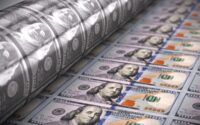Inflation worries fuel Japanese rush to buy gold
Receive free Japanese economy updates
We’ll send you a myFT Daily Digest email rounding up the latest Japanese economy news every morning.
The retail price of gold in Japan has jumped to an all-time high as the yen extends its historic slide against the US dollar and cash-laden households rush to find a hedge against inflation.
Buying of yen-denominated gold at the nation’s largest dealer has driven the price of the yellow metal above the ¥10,000 per gramme level for the first time in recent days. It was trading at ¥10,100 on Tuesday, according to retail prices published by Tanaka Kikinzoku, one of Japan’s largest gold retailers.
The retail gold price in Japan — the main reference price for the metal in the country — tracks global spot prices, which have been pushed up by the coronavirus pandemic, the war in Ukraine and tensions between China and the US. It also reflects a sharp fall this year in the yen, which recently passed ¥146.5 against the dollar — a level that last year triggered verbal market intervention by the Japanese authorities.
Currency analysts said the yen was likely to remain weak as long as there was no signal from the Bank of Japan that it was ready to tighten its ultra-loose policy and the gap in interest rate with the US and Europe remained wide.
Economists said the move in retail gold prices, which extends an 18-month rally at gold stores around Japan, was part of a rapid shift in household attitudes to risk as years of deflation have given way to rising consumer prices.
Jesper Koll, an economist and adviser to the Japan Catalyst Fund, an investment fund, said the primary driver for the buying by Japanese households was an urgent search for inflation protection after years without strong incentive to move assets out of cash. “The fact that gold is a non-yen asset helps, but the trigger is inflation,” said Koll.
Japanese households emerged from the pandemic with a record of more than ¥2 quadrillion in accumulated assets or around four times the country’s annual gross domestic product. About half of that was held in cash and deposits — a balance closely eyed by Japan’s securities houses, which are trying to convince customers that inflation is here to stay and they now need to switch their savings into other financial products. Core consumer price inflation in Japan reached 3.1 per cent last month.
“Inflation in Japan is at a crossroads,” said Tomohiro Ota, senior Japan economist at Goldman Sachs, noting that although consumer prices keep going up, some of the increase is down to temporary government subsidies while consumption growth has stalled since March. Goldman Sachs predicts that Japan’s currency will hit ¥155 against the dollar in the next six months.
Eiichiro Kato, a general manager for Tanaka Kikinzoku’s Precious Metals Retail Department, said that gold had become particularly attractive to customers concerned about the yen’s fall to multi-decade lows and their assets being denominated in yen.
Purchases of gold by central banks, news flow on the US economy and central bank policies were all driving the decision to buy gold in yen in the hope that the dollar-denominated gold price would remain high and stable, he said.
“We do not see many factors that would cause the dollar-denominated price to fall significantly, and we think that the yen-denominated price could rise further if the yen continues to weaken,” said Kato.
However, Hideo Kumano, chief economist at Dai-Ichi Research Institute, warned against reading too much into the rise in Japan’s gold price due to the small size of the market.
“It could prove to be an outlier and the country’s elderly population might not change their behaviour and start to consume, even if inflation does remain high,” he said.
[ad_2]
Source link


